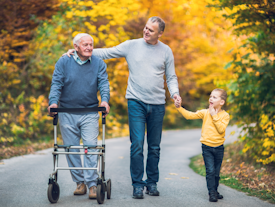Recognizing Seniors Depression: Symptoms and Warning Signs
This is a serious concern that is often under-recognized—seniors' depression. Compared with simple changes to a senior's mood, it still remains a very serious mental health condition that has an impact on quality of life.
From this perspective, identification of symptoms and warning signs proves helpful in making sure to have early intervention and effective treatment for depression among older adults.
Increased awareness of the symptoms and warning signs will further help caregivers and healthcare providers in taking their first steps toward the well-being of aging individuals coping with depression.
This article will help in detailing the critical warning signs in elderly depressed patients, allowing for timely support and care.
Life Assure Product Quiz
Take our 30 second quiz and discover which Life Assure medical alert device is the right fit for you or a loved ones.
Life Assure Product Quiz
Take our 30 second quiz and discover which Life Assure medical alert device is the right fit for you or a loved ones.
Symptoms of Seniors Depression

Let us get to know some of the major symptoms of seniors depression
Emotional Symptoms
Let us understand the emotional aspects of it:
1. Persistent Sadness or Feelings of Emptiness
One of the most common symptoms in seniors is long-standing sadness or emptiness. This is not meant to go further than just showing that one has feelings of sadness from time to time.
It is a persistent, overwhelming sense of hopelessness and despair that a past cannot be changed, no matter what happens in the future. This way, seniors feeling this may find it hard to enjoy something that used to delight them and be hopeless about things that are yet to come.
2. Irritability or Frustration Over Minor Issues
Older adults with depression may become easily annoyed or angered by what appears to others to be trivial matters. There is often little relationship between the magnitude of the event and an overreaction to it.
For example, an older adult who generally doesn't become upset over minor irritants—or would normally adjust well to a routine change—may become annoyed over the same matter. Mood changes from a baseline are very distressing to older adults and caregivers.
3. Loss of Interest in Hobbies or Social Activities
A very important symptom of depression in older adults is a significant decrease in interest in activities and hobbies that they used to enjoy doing.
The elderly, who perhaps would have gone out of their way to attend social functions, spend time on hobbies, or even attend community events, will slowly begin to withdraw and exhibit no interest at all in such activities anymore.
In fact, this withdrawal is not just about preference but a pointer to deeper emotional problems because depression can alter an individual's motivation and interest in life drastically.
4. Feelings of Worthlessness or Guilt
Common emotional symptoms of seniors depression are feelings of worthlessness and excessive guilt.
A person can get caught in the habit of feeling that he or she has done something wrong in the past, such as having failed in doing something or at times even not doing anything at all, which in the end manifests into unworthiness.
Such feelings incapacitate the ability of a person to believe in his or her self-worth and, therefore, enhance his or her feeling of hopelessness.
Physical Symptoms
Let us understand the physical aspects of it:
1. Unexplained Aches and Pain
Older adults with depression also report a variety of physical symptoms. For example, many older adult patients describe chronic, vague pains and discomfort that do not seem to have a clear medical cause.
Examples of physical complaints include hurt joints, backache, or vague aches all over the body.
2. Changes in Appetite or Weight
This might further alter drastically the person's eating habits, whereby the change in weight becomes very visible. Some just lose appetite, resulting in weight loss and malnutrition, while others turn to food for comfort, which in turn results in weight gain.
Changes in appetite and weight can sometimes act as a red flag for depression, further deteriorating the health and well-being of the individual.
3. Fatigue or Decreased Energy
Some of the hallmarks of depression include persistent, unwavering feelings of exhaustion and, conversely, a general lack of energy. Many seniors, even after having had a full night's sleep, wake up very fatigued, which progressively makes it hard to perform daily tasks and activities.
This is caused by fatigue, such that they no longer have the ability to engage in social life, maintain personal hygiene, or manage their homes—eventually leading to a further declension in the standard of life.
4. Sleep Disturbances, Such as Insomnia or Oversleeping
Another major depressive symptom associated with the elderly includes sleep disturbances. The sleep disturbances may relate to either insomnia, where an individual cannot easily sleep or, on the contrary, stay asleep.
Alternatively, they may manifest as hypersomnia, whereby the patient oversleeps but remains tired. However, they present themselves; sleep problems may exacerbate the symptoms of depression and diminish general health and daily functioning.
Warning Signs of Seniors Depression

Here are some of the major warning signs of seniors depression
1. Isolation from Social Interactions
Social withdrawal is one of the most telling warning signs for seniors' depression. Older adults can start to withdraw from friends, family, and social activities in general that they all liked doing.
It can be gradual—in fact, it often is—with the first steps of missing social events or declining invitations, and then it's a continuing downward spiral into total social withdrawal.
This type of withdrawal very often stems from feelings of sorrow, hopelessness, or a lack of interest, further increasing the person's feelings of loneliness and depression.
2. Memory Problems
This depression in the elderly can further develop into cognitive decline, some of which affects memory. The elderly may not remember what happened recently or some details, hence living in a frustrated and confused state.
Such cognitive impairment may be misdiagnosed as other states related to old age, like dementia, making it necessary to make a differentiation between depression and other medical conditions.
3. Difficulty Concentrating
Another cognitive symptom associated with seniors' depression is difficulties with concentration.
The inability to concentrate on some tasks or follow conversations can grossly affect daily functioning: a senior might find difficulty in doing everyday activities, making decisions, or holding meaningful conversations, and the overall quality of life decreases.
Conclusion
Identifying seniors' depression includes emotional and physical symptoms, the key warning signs being social withdrawal and cognitive decline.
Understanding the indicators is, therefore, very vital in offering timely support and intervention. Early detection followed by appropriate care will greatly enhance the quality of life of elderly people and guarantee necessary help.












 Get Help With The Push Of
A Button
Get Help With The Push Of
A Button















